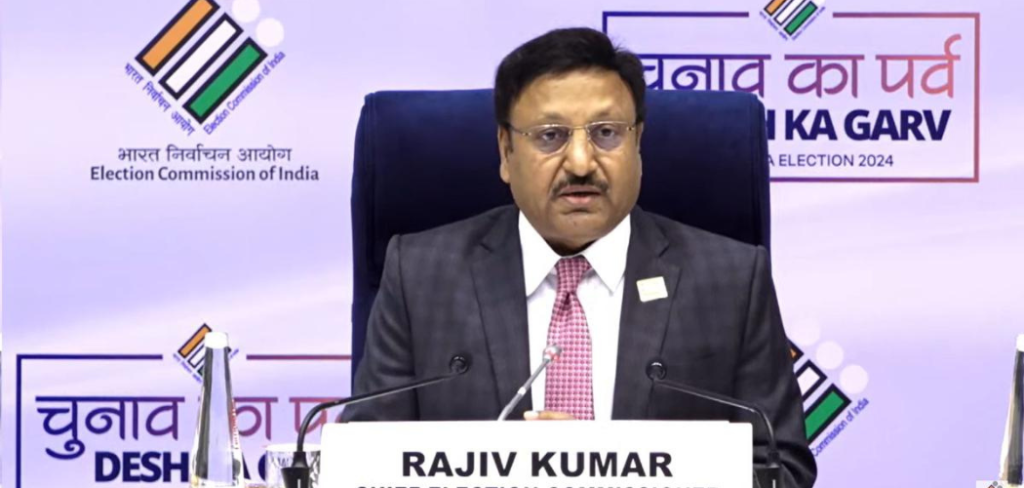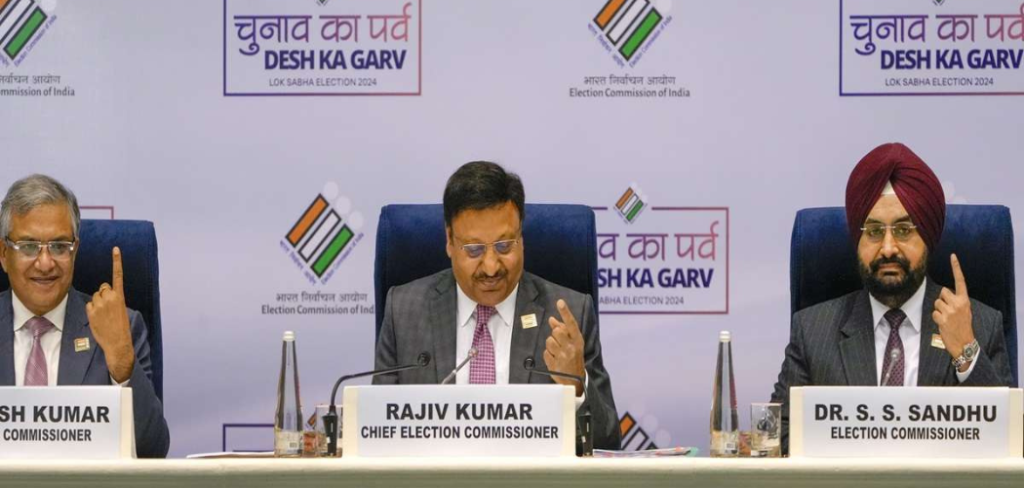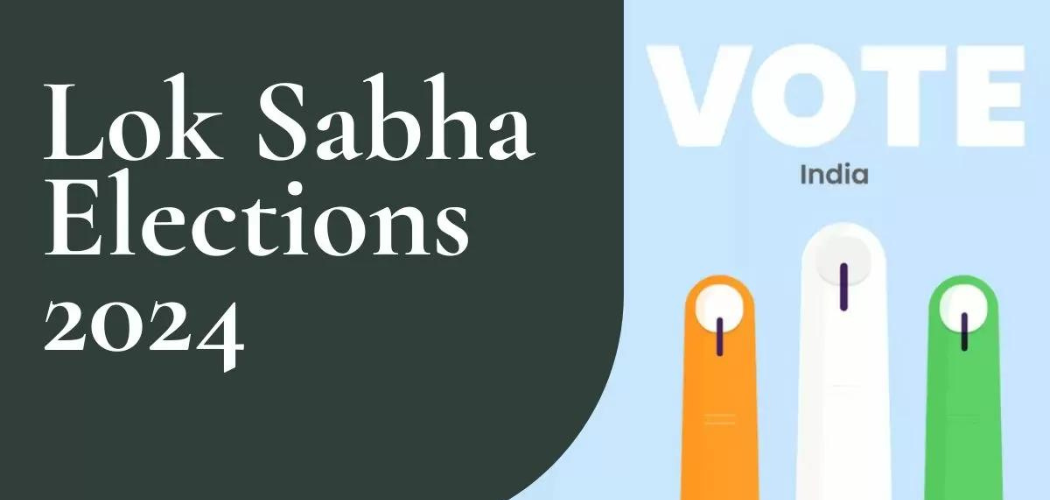The Lok Sabha elections in India stand as a testament to the nation’s democratic ethos, embodying the collective voice of its diverse populace. The announcement of the schedule for the Lok Sabha polls 2024 by the Election Commission marks the initiation of a monumental democratic exercise. With voting set to unfold in 7 phases from April 19 to June 1, followed by the counting of votes on June 4, the nation embarks on a journey of electoral significance. This comprehensive analysis delves into the intricacies of the electoral process, shedding light on the schedule, phases, electorate insights, and broader implications for Indian democracy.

Election Schedule and Phases: The meticulously crafted election schedule spans over several weeks, encompassing 7 distinct phases. Each phase is strategically designed to cover specific geographical regions, ensuring comprehensive electoral coverage while effectively addressing logistical challenges and security concerns.
Model Code of Conduct Implementation: The immediate enforcement of the Model Code of Conduct (MCC) upon the announcement of the schedule underscores the Election Commission’s commitment to ensuring free, fair, and transparent elections. The MCC imposes strict guidelines on political parties, candidates, and government entities, regulating their conduct in areas such as speeches, announcements, and election manifestos. By upholding the integrity of the electoral process, the MCC plays a pivotal role in safeguarding the democratic ideals enshrined in the Indian Constitution.
Press Meeting and Electoral Insights: The Chief Election Commissioner (CEC), Rajiv Kumar, led the Election Commission of India (ECI) in a press meeting to unveil the dates of the upcoming Lok Sabha elections in 2024. The press briefing provided invaluable insights into the electoral process, highlighting the scale, scope, and significance of the democratic exercise. Notably, nearly 97 crore eligible voters, representing diverse demographics and socio-economic backgrounds, are poised to participate in this historic electoral event. The comprehensive electoral insights shed light on various facets of the electorate, including gender distribution, age demographics, and voter accessibility.
Appointment of New Election Commissioners: The announcement of the Lok Sabha election date 2024 closely followed the appointment of two new Election Commissioners: Gyanesh Kumar and Sukhbir Singh Sandhu. This development, occurring in the wake of the surprise resignation of Arun Goel and the retirement of Anup Chandra Pandey, underscores the dynamic nature of electoral governance. The appointment of new Election Commissioners reaffirms the Election Commission’s commitment to upholding the highest standards of transparency, impartiality, and accountability in the electoral process.

Simultaneous Assembly Elections and By-Elections: In addition to the Lok Sabha polls, assembly elections for Andhra Pradesh, Arunachal Pradesh, Odisha, and Sikkim are slated to occur simultaneously. This coordinated electoral effort streamlines the electoral process, enabling efficient resource allocation and ensuring comprehensive voter outreach. However, the Election Commission’s decision against holding the Jammu & Kashmir state polls concurrently underscores the paramount importance of security considerations in electoral planning. Furthermore, the announcement of by-elections to 26 Assembly seats across states adds another layer of electoral engagement, reflecting the dynamic nature of Indian democracy.
Electoral Phases and Insights: The phased approach to conducting elections ensures systematic coverage of constituencies across states, facilitating maximum voter participation and engagement. Uttar Pradesh, West Bengal, and Bihar emerge as key battlegrounds, with the longest voting schedules spanning across seven phases. This is followed by Maharashtra and Jammu & Kashmir in five phases; Jharkhand, Madhya Pradesh, and Odisha in four phases; Assam and Chhattisgarh in three phases; and Karnataka, Manipur, Rajasthan, and Tripura in two phases. The remaining states and Union Territories are slated to go to polls on a single day, highlighting the diverse electoral landscape of India.
The electorate, comprising nearly 97 crore eligible voters, represents a microcosm of India’s socio-cultural fabric. With 49.7 crore male voters and 47.1 crore female voters, gender parity in electoral participation remains a cornerstone of democratic governance. Additionally, the inclusion of 1.8 crore first-time voters underscores the generational shift in electoral dynamics, heralding a new era of political engagement and activism. Furthermore, the presence of 88.4 lakh Persons with Disabilities (PwD) voters underscores the Election Commission’s commitment to ensuring inclusive and accessible electoral processes. The participation of 82 lakh voters aged 85 and above reflects the demographic diversity of the Indian electorate, highlighting the significance of intergenerational dialogue and representation in democratic governance. Moreover, the presence of 19.1 lakh service electors underscores the vital role of the armed forces in safeguarding India’s democratic ideals and national security. The inclusion of 2.18 lakh centenarians and over 48,000 transgender voters reflects the diverse tapestry of Indian society, emphasizing the importance of inclusive and representative democracy.
| Category | Number |
| Total Voters | 97 Crore |
| Male Voters | 49.7 Crore |
| Female Voters | 47.1 Crore |
| First-Time Voters | 1.8 Crore |
| PwD Voters | 88.4 Lakh |
| Voters Aged 85 and Above | 82 Lakh |
| Service Electors | 19.1 Lakh |
| Centenarian Voters | 2.18 Lakh |
| Transgender Voters | Over 48,000 |
| Young Voters | 19.74 Crore |
Conclusion: As the nation embarks on the Lok Sabha elections 2024, characterized by its scale, complexity, and democratic fervor, the electoral landscape assumes paramount importance. The meticulous planning, strategic allocation of phases, and unwavering commitment to democratic principles underscore the resilience and vibrancy of Indian democracy. As voters across the nation exercise their franchise, the integrity and fairness of the electoral process remain sacrosanct, ensuring a level playing field for all stakeholders. The Lok Sabha elections 2024 stand as a testament to India’s democratic ethos, embodying the collective aspirations and values of its diverse populace. As the nation awaits the eagerly anticipated results, the electoral journey serves as a reaffirmation of India’s commitment to democratic governance, pluralism, and inclusive development.
